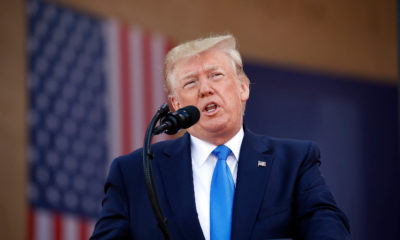World
Millions of people voted illegally: Donald trump
Washington: The White House said that there is no evidence to support the alleged “election fraud” claimed by President-elect Donald Trump, who on the weekend said that “millions” of people voted “illegally” for his Democratic rival, Hillary Clinton, in the November 8 election. On Sunday, Trump said on Twitter that he would have beaten Clinton in the nationwide popular vote “if you deduct the millions of people who voted illegally”.
He also called into question the results in three states he lost to Clinton, saying “Serious voter fraud in Virginia, New Hampshire and California — so why isn’t the media reporting on this? Serious bias — big problem!” but offering no evidence of the supposed fraud. However, there has been “no evidence produced to substantiate” Trump’s claims, White House press secretary Josh Earnest said on Monday, Xinhua news agency reported.
Trump has resurrected the claim of election fraud in an apparent attempt to divert the media focus on the vote recounts requested by the Green Party in Wisconsin, Pennsylvania and in Michigan. The mogul’s transition team insisted on Monday that there is evidence of election fraud. Trump’s reaction came after Clinton’s campaign said on the weekend that it would “participate” in the Green Party’s recount effort.
Meanwhile, Trump transition team spokesman Jason Miller told reporters on Monday that it is “ridiculous wasting oxygen” on recounts, labelling it a fundraising “scam by Jill Stein in an election already conceded” and an effort that will not change the overall election result. Trump won 306 votes in the Electoral College to Clinton’s 232; putting him above the 270 votes needed there to win the presidency.
But the College’s electors are scheduled to formally vote on the matter on December 19 and Trump will not officially be declared the winner until he secures at least 270 of their votes.
World
Lockdowns in China Force Urban Communities to Defy Censorship and Vent Frustration Online

Shanghai’s rich middle class is leading a wave of online dissent over the strict and prolonged lockdowns imposed in various parts of the country. Chinese internet censorship is struggling as patience is wearing thin in many urban centers, coming up with creative forms of online protests.
Social Media Posts Revealing Lockdown Tension in Shanghai
Drawn-out lockdowns are nothing new in China as authorities insist with the nation’s zero-Covid policy since the start of the pandemic. Currently over This time around, however, metropolitan areas like Shanghai are increasingly difficult to keep quiet, given that its more than 25 million residents have seen weeks of total isolation along with food shortages and many other service interruptions.
Dozens of towns and reportedly over 300 million Chinese citizens have been affected by lockdowns of different severity. As expected, urban netizens have been most outspoken over their difficulties by finding creative ways to get around state censorship and bans placed on topics, news comments and spontaneous campaigns.
Shanghai residents have been using mobile proxies and hijacking seemingly unrelated hashtags to talk about healthcare issues, delivery failures and the overall severity of their situation. The “positive energy” that the Chinese government wants to transmit during the recent prolonged series of lockdowns does not come naturally to those counting food supplies and online censors are working hard to filter words, trending topics and undesired social media sharing.
WeChat groups and message threads are under constant monitoring. Posts questioning the zero-Covid approach have been quickly deleted, including by leading Chinese health experts like Dr. Zhong Nanshan. Video footage is soon censored and protests and investigations are quickly made to disappear.
Where this has not worked, officials have exposed banners with warnings and outright threats like “watch your own mouth or face punishment”, while drones have been patrolling the city skies. Yet, if anything, this has led to further tensions and unspoken confrontation with Shanghai’s educated and affluent middle class.
Creative Online Solutions Harnessing Civic Energy
Announcements by Chinese social media that they would be publishing the IP addresses of users who “spread rumors” have not helped either. Tech industry research has shown that much of Asia’s tech-savvy population has a habit of using mobile proxies and other privacy tools, quickly finding workarounds to browse the internet freely and talk to the world about the hottest topics.
The sheer volume of forbidden posts is already a challenge for the very censorship system, experts explain. Unable to track all trending hashtags, state workers overlook topics that speak about the US, Ukraine or other popular news. Linking human rights elsewhere to their situation, Chinese online dissidents establish their informal channels and “hijack” the conversation to share personal or publicly relevant information about the Covid suppression in their town.
Sarcastic and satirical posts still dominate. Others hope to evade the censors by replacing words from famous poems or the national anthem. One thing is certain – social media, when harnessed with the right creativity, has proven its ability to mount pressure on the government in even some of the most strictly controlled tech environments like China.




















